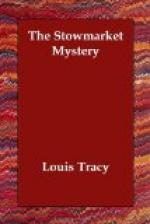It was a hypodermic syringe.
Again Ooma uttered that weird cry.
“This is the end,” he said. “You have not beaten me. It is Fate.”
He folded his arms and looked at them. A change came over his face. He was no longer a tiger at bay, but a human being, calm, dignified, almost impressive.
“I arrest you—” began Winter.
“You fool!” laughed the Japanese, with a quiet contempt in his tone; “I shall be dead in twenty minutes. That syringe contained snake poison, the undiluted venom of the karait. Put away your pistols. They are not wanted.”
Quite nonchalantly he leaned back against the bookcase that lined the wall. He turned his eyes to Robert.
“You have the luck of your race,” he said “If that point had reached your skin no human skill could have saved you. As it is, you are spared, and I must go. The same blood flows in our veins, yet you are my enemy. I wish I could once get my fingers round your throat before my strength fails.”
“Come from behind that table and try,” was the quick rejoinder.
Ooma made to accept the challenge, but Brett intervened.
“If you are telling the truth,” he said, “you can spend your brief remaining span of life to better purpose than in a mad combat with one who has done you no harm. Where is Capella?”
“I killed him,” was the cool reply.
The footman, who had slowly regained his senses, uttered a groan of horror. By this time several men, not alone house servants, but gardeners, grooms, and others, had gathered on the lawn.
“Send away that slave,” cried Ooma impatiently, “and tell those others to go to their kennels. This is no place for such.”
Brett knew that the Japanese was in truth about to die. Afterwards Winter and Holden confessed that they thought the pretence of injecting snake poison was a mere ruse to gain time. Robert and David intuitively agreed with the barrister. It was in their breed to know when eternity yawned for one of them. The very calmness of the criminal, his magnificent apathy, his dislike of vulgar witnesses, foreboded a tragedy.
Brett motioned to Holden to open the door, and the footman gladly made his escape. In response to a wave of the barrister’s arm the other servants disappeared from view, though they probably only retreated to a greater distance, and could see well enough all that happened.
“Yes,” continued Ooma, “I killed Capella. It was a mistake. Everything is a mistake. It was foolish on my part to kill Alan Hume-Frazer, even though he was my enemy. I should have let him live, and tortured him by fear. You English dread these scandals worse than death. We Japanese fear neither. For I am a Japanese, and I am proud of it, although my ancestor was David Hume of Glen Tochan, who fought and killed the man who robbed his father.”
“But how and why did you kill Capella?” asked Brett.




